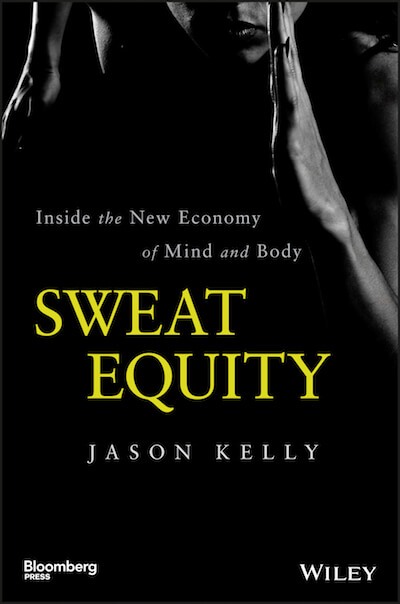Proof That Lululemon Is More Influential Than You Even Knew
Jason Kelly, the New York bureau chief at Bloomberg and serial marathoner, dives into the (lucrative) world of wellness in his new book, Sweat Equity. This week, he shares with Well+Good an excerpt that explains Lululemon's origins—and how it changed the athleisure game (starting with the term itself).
Chip Wilson was practically late for his own wedding because he was too busy selling yoga pants.
The founder of Lululemon marks his 2002 wedding day as a turning point in his company’s life. What was then a one‐location retailer in Vancouver, British Columbia, mushroomed into a $7 billion juggernaut. That made Wilson famous (and, at times, notorious). It made him a billionaire several times over, and helped launch a fashion category that did not exist before.

The yoga pant, as popularized by Wilson’s company, is the iconic apparel item of the fitness economy. In its utility and ubiquity, the sleek, expensive, casual piece of clothing epitomizes how fitness has shifted for many people from something we do to who we are. Giving people, especially women, something that doubled as activewear and streetwear reflected a broader move, Wilson says. “There was a mindset shift, toward longevity and health, and away from drinking and smoking and working.”
Today, Lululemon apparel, with its tiny, stylized logo, is ever‐present on the sidelines of soccer games, in carpool lines, at coffee shops, and on airplanes. The pants and tops spawned a raft of imitators, including some of the biggest names in athletic apparel, as well as a new term—athleisure—for the style of clothing that seems fit for the gym, but is worn many places besides. Such casualwear doesn’t come cheap, and the product’s popularity and price point (upwards of $100 for a pair of Lulu pants) points toward the affluence associated with this type of fitness fashion.

{{post.sponsorText}}
The Lululemon story is one of innovation and anticipation, peppered with missteps and misstatements, course corrections and rapid growth. It starts as a classic entrepreneurial tale, where a big thinker boldly moves in a way few of us have the guts to, and helps create a new market in the process. Chip Wilson saw a chance, and he took it, and he knew it the day of his wedding: “I said, ‘I’ve got something here,’” he says. “Either I’ve got to make it big or I’m going to get run over.”

Lululemon was born in 1998 when Wilson, who’d been in the business of surfing, skating, and snowboarding apparel and equipment, opened a store in Vancouver, British Columbia. The Lululemon name was the product of a 100‐person survey, selected from 20 names. Wilson identified that the company needed to be more than a store, highlighting the community aspect of the endeavor. He wanted it to be a place where the staff was smart and able to engage customers not just on what they were wearing, but also about how they were living. “It was a people development company as much as an apparel company, because I only wanted to work with people I loved and respected,” Wilson says.
Vancouver was, and remains, the perfect laboratory for companies like Lululemon and entrepreneurs like Wilson. Gregor Robertson, the city’s mayor, is a tall, athletic guy whose preferred mode of transport is a bicycle.
Where Manhattanites measure success on money or position, a Vancouverite’s more likely to brag about his or her run, ride, or hike
Robertson says Vancouver, by design and climate, encourages the sort of culture embodied at companies like Wilson’s. “It’s a dominant way of life, to be outdoors,” Robertson says. “The combination of contemplative and active is part of the city’s DNA.”
Part of it, he says, owes to the way the city is laid out, with many buildings looking out toward the sea, rather than in, on each other. “We’re an outward‐facing city,” he says.
Wilson says all of it changes the people who live and work there, down to how they define success. “An alpha male or an alpha female, they’re completely different,” he says, especially versus hard‐charging financial hubs like New York. Where Manhattanites measure success on money or position, a Vancouverite’s more likely to brag about his or her run, ride, or hike. Wilson himself can barely have a conversation without a mention of, or invitation to, the Grouse Grind, an insanely vertical hike in Vancouver he takes on daily, if not more. He counsels that everyone benefits from sweating for an hour a day.

His timing was impeccable, and Lululemon became one of those companies that both benefits from and helps define a trend. Big money came calling. Representatives of Advent International, a well‐known global private equity firm that backed companies like Party City and The Coffee Bean, first encountered the company at an outdoor sports equipment convention in 2004, having identified the broader wellness trend several years earlier. Six months after the first encounter, and a series of cold calls to the company by junior investors at Advent, the apparel maker said it was seeking funding.
Advent invested in Lululemon in 2005 with the idea of expanding the management team, product lines, and geographic reach. The next two years were frenzied, as Lululemon tapped executives from across the retail and consumer world and built a company that could scale its operations globally. From its base in Canada and a handful of other stores in the United States, Lululemon opened outlets in Los Angeles and San Francisco, among other American cities, and also went far afield, to Tokyo and Sydney.
Lululemon became a poster child for the industry, and for how private equity firms might exploit the trend toward fitness and wellness
By the end of 2007, the year of its initial public offering, Lululemon had 80 stores. Advent said, citing Thomson Reuters data, that out of 177 offerings that year, Lululemon was the third‐best performing IPO. The company continued to consistently grow fast. Up until 2013, sales rose 30 percent or more for 14 straight quarters. The company posted its first $1 billion revenue year in 2012.
Lululemon became a poster child for the industry, and for how private equity firms might exploit the trend toward fitness and wellness. This was a situation where an investor saw an opportunity not in the activity, but in the adjacent elements. Advent also saw what Wilson had identified: this wasn’t just about the clothes, it was about a way of life.
This is the second in Well+Good's four-part Sweat Equity excerpt series—catch up on last week's installment here!
Loading More Posts...